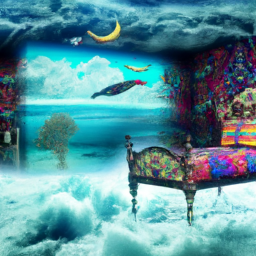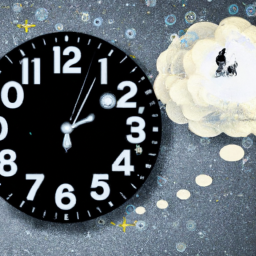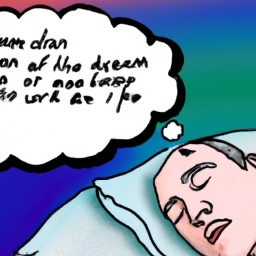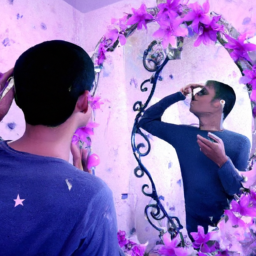Dream Meaning
Which Researcher Believed That Dreams Simply Reflect Life Events That Are Important To The Dreamer?

Being someone deeply intrigued by dreamscapes, I’ve regularly pondered over the different theories that attempt to elucidate their meanings and relevance. A particularly captivating viewpoint on dreams proposes that they are mere reflections of events and experiences holding great importance to the dreamer.
In this article, I will explore the work of a researcher who held this belief and delve into the implications of this theory for our understanding of dreams.
The researcher in question is Calvin S. Hall, a prominent psychologist who spent much of his career studying the content and meaning of dreams. Hall’s theory is based on the idea that dreams serve as a kind of ‘mental processing’ mechanism, allowing us to work through the events and emotions that are most salient in our lives.
According to Hall, dreams are essentially a reflection of our waking experiences, filtered through the lens of our unconscious mind. By analyzing the content of our dreams, we can gain insight into our deepest fears, desires, and conflicts, and perhaps even find solutions to problems that have eluded us in waking life.
Key Takeaways
- Calvin S. Hall believed that dreams reflect personal experiences and emotions.
- Dreams can serve as a mental processing mechanism to work through salient events and emotions.
- Dreams can reveal repressed or unconscious thoughts and emotions.
- However, criticisms of Hall’s theory suggest that dreams may not always reflect important life events.
Sigmund Freud’s Perspective on Dreams
You might be interested to know that Sigmund Freud believed that dreams were a reflection of the important events in your life. According to him, dreams were a form of wish-fulfillment, where the unconscious mind manifests the desires that the conscious mind suppresses.
Freud believed that dreams contained hidden meanings and symbolism that could reveal a person’s deepest fears, desires, and conflicts. For Freud, dreams were not random or meaningless, but rather, they were a window into the unconscious mind.
He believed that by analyzing dreams, a person could gain insight into their personality, motivations, and behavior. However, Freud’s theories on dreams have been criticized over the years for being too subjective and lacking scientific evidence.
Nevertheless, his ideas on dream analysis have had a significant impact on modern psychology and continue to influence the way we think about dreams today.
Speaking of different theories on dreams, let’s now take a look at Calvin S. Hall’s perspective on this fascinating topic.
Calvin S. Hall’s Theory of Dreams
Calvin S. Hall proposed that dreams are a manifestation of our subconscious thoughts and emotions. According to his theory, dreams simply reflect life events that are important to the dreamer. In other words, our dreams are a reflection of our personal experiences and emotions that we may not be consciously aware of.
To better understand Hall’s theory, here are four key points:
- Dreams aren’t random, but they reflect our personal experiences and emotions.
- Dreams can help us process and cope with difficult life events.
- Dreams may reveal repressed or unconscious thoughts and emotions.
- Dreams can be interpreted and analyzed to gain insight into our subconscious.
Hall’s research on dream content further supports his theory that dreams are a reflection of our personal experiences and emotions.
Hall’s Research on Dream Content
Interestingly enough, Hall’s study on dream content revealed that recurring themes and symbols appeared across a large sample of people’s dreams. He believed that these symbols and themes were reflections of life events that were important to the dreamer.
For example, if someone had a recurring dream about falling, Hall theorized that it may represent a fear of failure or a lack of control in their waking life.
However, Hall’s theory has faced criticisms from some researchers who argue that dreams may not always reflect important life events. They suggest that dreams can be a result of random neural activity or simply a way for the brain to process information.
Despite these criticisms, Hall’s research on dream content has provided valuable insights into the symbolic language of dreams and how they may relate to our waking lives.
Criticisms of Hall’s Theory
Despite the criticisms faced by Hall’s theory, it has provided valuable insights into the symbolic language of dreams and their potential connections to our waking experiences.
However, some critics argue that Hall’s focus on the manifest content of dreams, or the literal imagery that appears in dreams, ignores the more subtle aspects of dream symbolism. For example, some dreams may have a particular emotional tone or atmosphere that can reveal deeper insights into an individual’s psychological state.
Furthermore, other researchers have suggested that dreams don’t simply reflect life events that are important to the dreamer but may also serve as a means of problem-solving or processing emotions. These alternative perspectives on dream analysis highlight the complexity of the human mind and the multiple functions that dreams may serve.
By exploring different theories and interpretations of dream symbolism, we can gain a deeper understanding of ourselves and our relationships with the world around us.
Other Perspectives on Dream Analysis
Exploring different theories and interpretations of dream symbolism can provide a deeper understanding of ourselves and our relationships with the world around us. While Hall’s theory emphasized the importance of personal experiences in dream analysis, there are other perspectives that suggest dreams may serve multiple functions beyond simply reflecting our waking experiences.
For instance, some researchers believe that dreams can act as a coping mechanism, helping individuals process emotions and deal with stress. Moreover, other researchers argue that dreams can reveal unconscious desires and motivations that may not be apparent in our waking lives.
For instance, the psychoanalyst Carl Jung believed that dreams reflect archetypes and universal symbols that are shared across cultures. By analyzing these symbols, individuals can gain insight into their deepest desires and fears. With these different perspectives on dream analysis in mind, it becomes clear that dreams may have more complex meanings than we initially realize.
This leads us to the subsequent section about common themes in dreams.
Common Themes in Dreams
You may have noticed that certain themes tend to recur in your dreams, such as falling, flying, or being chased. These common themes can provide insight into your subconscious thoughts and emotions.
For example, falling dreams may indicate a fear of failure or loss of control, while flying dreams may symbolize a desire for freedom or escape from a situation. Being chased in a dream may represent a feeling of being pursued or threatened in waking life.
Understanding these common themes in your dreams can be helpful in identifying and addressing underlying emotions and conflicts. When you analyze your dreams, you can gain a better understanding of your inner world and how it relates to your external experiences.
This is why dream analysis is important for personal growth and self-awareness.
Importance of Dream Analysis
Understanding the messages hidden within dreams can be a powerful tool for personal growth and self-awareness. As a believer in the importance of dream analysis, I’m convinced that our dreams are a reflection of our subconscious mind. They reveal our deepest desires, fears, and hopes, often depicting life events that are important to us.
When we analyze our dreams, we gain insight into our inner selves. We can identify patterns that may be holding us back or preventing us from achieving our goals. By paying attention to the symbols and themes in our dreams, we can understand our emotions and work through any unresolved issues. This can help us make better decisions in our waking life and improve our overall well-being.
In the next section, we will explore some techniques for analyzing dreams and uncovering their hidden messages.
Techniques for Analyzing Dreams
When it comes to analyzing dreams, I’ve found that keeping a dream journal is an effective technique. I write down everything I remember about my dreams as soon as I wake up, including any emotions or sensations I felt during the dream.
Another method I’ve tried is working with a therapist who specializes in dream analysis. This has helped me gain deeper insight into the messages my dreams are trying to convey.
Keeping a Dream Journal
Keeping a dream journal can help me gain insight into my subconscious mind and identify patterns in my dreams that reflect important life events. Here are some tips that I find helpful when keeping a dream journal:
-
Write down my dreams as soon as I wake up: Dreams can fade quickly from memory, so it’s important to record them as soon as possible after waking up.
-
Record as much detail as possible: Even small details can be important, so I try to write down everything I remember about my dreams, including emotions, colors, and sounds.
-
Look for patterns: Over time, I may notice recurring themes or symbols in my dreams that can provide insight into my subconscious thoughts and feelings.
-
Reflect on my dreams: After writing down my dreams, I take some time to reflect on what they might mean and how they relate to my life.
Reflecting on my dreams can be a helpful way to gain insight into my subconscious mind and identify patterns that may be related to important life events. Working with a therapist can also be a valuable tool for understanding the deeper meanings behind my dreams.
Working with a Therapist
Working with a therapist can bring a sense of relief and comfort, as they’re trained to help individuals navigate through their emotions and thoughts.
When it comes to dreams, a therapist can be especially helpful in understanding their meaning and significance. They can provide a safe and non-judgmental space for individuals to explore their dreams and connect them to their waking life.
A therapist who believes that dreams simply reflect life events that are important to the dreamer can help individuals identify any patterns or themes in their dreams. By exploring these patterns, individuals can gain a deeper understanding of their subconscious thoughts and emotions.
Through therapy, individuals can also learn techniques to cope with any difficult emotions or experiences that may arise in their dreams, allowing them to better process and integrate these experiences into their waking life.
Frequently Asked Questions
What is the historical significance of dream analysis in different cultures?
Dream analysis has had a significant role in various cultures throughout history. Many cultures believed that dreams were a way to communicate with the spiritual world and gain insight into the future. Some cultures also used dreams for healing and problem-solving.
How do cultural and societal factors influence dream interpretation?
When interpreting dreams, cultural and societal factors can greatly impact how individuals perceive and understand their dreams. These influences can shape the symbolism and meaning behind certain images or experiences within a dream.
What is the relationship between dream content and mental health?
As the saying goes, "dreams are the window to our subconscious."Research suggests that dream content can reveal underlying mental health issues, such as anxiety or trauma. Understanding and interpreting dreams can aid in therapy and self-discovery.
How do lucid dreams differ from regular dreams, and what is their significance?
Lucid dreams are when you become aware that you are dreaming and can control the dream. They differ from regular dreams in that you have more control and can explore your subconscious. They can have significance in personal growth and problem-solving.
Can dreams provide insight into future events or predict the future?
Have you ever woke up from a dream feeling like it was a premonition? While some believe dreams can predict the future, research suggests they only reflect important events in our lives.
Conclusion
In conclusion, exploring the world of dreams can be a fascinating and enlightening experience. Whether you subscribe to Freud’s belief that dreams reveal our deepest desires and fears or Hall’s theory that they reflect important life events, there is no denying that dreams hold significant meaning.
While there are many criticisms of Hall’s theory, his research has shed light on the common themes and symbols found in dreams. Analyzing dreams can be a valuable tool for gaining insight into one’s psyche and can lead to personal growth and development.
As Carl Jung once said, "Who looks outside, dreams; who looks inside, awakes."So, let’s not be afraid to dive into the depths of our subconscious and explore the mysterious world of dreams.
For as Shakespeare famously wrote, "We are such stuff as dreams are made on."And our lives can be enriched and transformed by the insights and revelations they bring.
Eislyn is a gifted writer whose words weave enchanting narratives within the realm of dreams. With a profound love for storytelling and a deep curiosity about dreams, Eislyn’s articles transport readers into vivid dreamscapes.
Her writing style is both eloquent and thought-provoking, captivating readers’ imaginations and inspiring them to dive deeper into the mysteries of their own dreams. Eislyn’s exploration of dream symbolism and interpretation adds depth and nuance to our content, making it an absolute pleasure for dream enthusiasts to engage with.
Lucid Dreaming Techniques
Why Don’t Dreams Make Sense

Have you ever awakened from a dream and thought to yourself, ‘What just happened?’
Dreams can be like a bizarre movie that only you can see, filled with strange characters, events, and situations that make no logical sense. It’s like our brains have a secret stash of surrealism that only comes out when we close our eyes.
But why don’t dreams make sense? As someone who has always been fascinated by the mysteries of the mind, I decided to delve deeper into the topic and explore some possible explanations.
Dreams are like a carnival ride for the brain, taking us on twists and turns that we never could have imagined. They can be filled with vivid colors, emotions, and sensations that seem incredibly real at the time. But upon waking up, we often struggle to make sense of what we experienced.
It’s like trying to piece together a puzzle with missing pieces or reading a book with pages torn out. So why do our dreams leave us feeling so confused and disoriented?
In this article, we’ll explore the role of the subconscious mind, the brain’s process of dreaming, and the influence of culture on dream interpretation. So buckle up and get ready to explore the weird and wonderful world of dreams!
Key Takeaways
- Dreams are a reflection of the complex and often unpredictable workings of the subconscious mind.
- The brain weaves together fragments of information to form a vivid and coherent dream experience, but external stimuli can greatly influence dreams and create a more coherent experience.
- The interpretation of dreams varies across cultures, with Western societies often viewing dreams as symbolic and revealing hidden meanings.
- Dreams leave us feeling confused and disoriented because they’re a reflection of the complex processes that occur within our brains while we sleep.
The Role of the Subconscious Mind in Dreams
You may not realize it, but your subconscious mind plays a huge role in creating the nonsensical and bizarre dreams that you experience each night.
While you are asleep, your brain is still active and your subconscious mind takes over. It’s responsible for creating the vivid and sometimes illogical dream scenarios that you experience.
The subconscious mind is constantly processing and organizing your thoughts, memories, and emotions. It takes these fragments and creates stories that can be both fascinating and confusing.
As a result, dreams may not always make sense because they’re a reflection of the complex and often unpredictable workings of the subconscious mind.
This leads to the brain’s process of dreaming, which is influenced by various factors.
The Brain’s Process of Dreaming
As I delve into the subtopic of the brain’s process of dreaming, I’m fascinated by the role of memory consolidation in this phenomenon.
Additionally, I’m curious about the impact of external stimuli on the content of our dreams, and how the brain connects different pieces of information to create a cohesive dream narrative.
Exploring these key points can provide a deeper understanding of the complex processes that occur within our brains while we sleep.
The role of memory consolidation
Like a puzzle with missing pieces, dreams often seem nonsensical because the brain is consolidating memories in a way that doesn’t always follow logical sequences.
During sleep, the brain replays and integrates the memories from the day, but it also has to filter out irrelevant information. This can result in a jumbled mix of memories, emotions, and sensations that don’t always make sense.
However, external stimuli can also influence our dreams and make them more coherent. For example, if you fall asleep while watching a movie or listening to music, elements of those experiences may appear in your dreams.
This is why it’s important to create a conducive sleep environment that minimizes distractions and promotes relaxation, so that your brain can consolidate memories in a more orderly fashion.
The impact of external stimuli
External stimuli can greatly influence your dreams and create a more coherent experience, especially if you intentionally create a relaxing sleep environment. For example, if you fall asleep with a TV on, your dreams may incorporate the sounds and images you hear from the TV. Similarly, if you fall asleep in a noisy environment, your dreams may be more chaotic and disjointed.
On the other hand, if you sleep in a quiet and comfortable environment, your dreams may be more peaceful and cohesive. This is because the brain is not being bombarded with external stimuli, allowing it to focus on creating a more structured dream experience. To illustrate this concept, consider the following table:
| Sleep Environment | Dream Experience |
|---|---|
| Noisy and Uncomfortable | Chaotic and Disjointed |
| Quiet and Comfortable | Peaceful and Cohesive |
Understanding how external stimuli impact your dreams can help you create a better sleep environment and improve the quality of your dreams. In the next section, we will explore how the brain connects different pieces of information to create a more meaningful dream experience.
How the brain connects different pieces of information
The brain weaves together fragments of information to form a vivid and coherent dream experience. Our brain takes different pieces of information, memories, and emotions and combines them to create a dream narrative. For example, a dream about flying might be triggered by a recent conversation about airplanes, a childhood memory of playing with kites, and a desire for freedom and escape.
This process of connecting different pieces of information is called synthesis. The brain synthesizes information by creating new connections between neurons, strengthening existing connections, and pruning unnecessary connections. This allows us to journey through fantastical worlds and surreal landscapes.
However, the way we interpret our dreams is also influenced by our cultural background, personal experience, and societal norms.
The Influence of Culture and Society on Dream Interpretation
One cannot underestimate how deeply cultural and societal norms shape the way dreams are interpreted and understood. Growing up in a Western society, I was taught that dreams were often symbolic and that they could reveal hidden meanings about my innermost thoughts and desires.
However, when I traveled to other parts of the world, I discovered that this was not always the case. In many cultures, dreams are viewed as a way to communicate with ancestors or spirits, and the symbolism found in Western dream interpretation is often absent. Instead, dreams are seen as important messages that must be carefully deciphered in order to gain insight into one’s life.
This stark contrast in interpretation highlights the power of culture and society in shaping our understanding of the world around us, including our own dreams. As I delve deeper into the topic of dreams, I’m excited to explore the different types of dreams that people experience and how they’re interpreted across various cultures.
The Different Types of Dreams
I’ve always been fascinated by the different types of dreams that we experience. Three types that really stand out to me are lucid dreaming, nightmares, and recurring dreams.
Lucid dreaming is when you become aware that you’re dreaming and can even control the dream.
Nightmares can be terrifying and leave you feeling unsettled long after you wake up.
Finally, recurring dreams can be incredibly frustrating because they seem to repeat themselves over and over again without any clear resolution.
Lucid dreaming
You can take control of your dreams and experience the ultimate form of escapism through lucid dreaming, where you become the master of your own subconscious world. In a lucid dream, you are aware that you are dreaming, and you can manipulate the dream’s plot, characters, and setting. This type of dream allows you to explore your desires, solve problems, practice skills, and face your fears in a safe and controlled environment.
To help you understand the difference between a regular dream and a lucid dream, here is a table:
| Regular Dream | Lucid Dream |
|---|---|
| You are not aware that you are dreaming | You are aware that you are dreaming |
| You cannot control the dream | You can control the dream |
| The dream may not make sense | The dream can make sense |
| You may forget the dream upon waking up | You can remember the dream in detail |
Lucid dreaming can be a fun and exciting experience, but it can also be a powerful tool for personal growth and self-discovery. By learning how to lucid dream, you can gain insights into your subconscious mind, overcome phobias, and improve your creativity and problem-solving skills. However, not all dreams are pleasant, and sometimes they can turn into nightmares.
Nightmares
Nightmares can be terrifying experiences that leave us feeling shaken and disturbed upon waking up. They’re vivid, often unpleasant dreams that can range from feeling trapped or threatened to experiencing the loss of a loved one.
Here are three reasons why nightmares may occur:
-
Stressful events or situations: When we experience stressful events or situations in our waking life, they can often manifest in our dreams. These dreams may be a reflection of our anxiety or fear surrounding those events.
-
Trauma: Trauma can leave a lasting impact on our subconscious, and nightmares may be a way for our mind to process and cope with that trauma.
-
Sleep disorders: Certain sleep disorders, such as sleep apnea or restless leg syndrome, can disrupt our sleep and lead to nightmares.
As unsettling as nightmares can be, they’re a normal part of the dreaming process. They can also be a sign that our mind is working through something important.
In the next section, we’ll explore another type of dream – recurring dreams.
Recurring dreams
When you keep having the same dream over and over again, it’s like a broken record playing on repeat, stirring up feelings of frustration and confusion. Recurring dreams are a common phenomenon, with many people experiencing them throughout their lives. These dreams may have different themes, but they always involve the same basic scenario or situation. For example, you might dream about falling from a great height, being chased by an unknown assailant, or being lost in a maze-like structure.
To illustrate, consider the following table:
| Recurring Dream | Meaning | Possible Interpretation |
|---|---|---|
| Falling | Loss of control | Fear of failure or letting go of something |
| Being chased | Feeling trapped | Anxiety or feeling pursued by a problem |
| Being lost | Lack of direction | Uncertainty about the future or feeling lost in life |
These dreams often leave us feeling puzzled and wondering why they keep happening. However, they can provide valuable insight into our subconscious thoughts and emotions. By paying attention to the recurring themes in our dreams, we can start to identify patterns and gain a better understanding of ourselves. In the next section, we will explore some tips for better dream recall and interpretation, which can help us unlock the mysteries of our dreams.
Tips for Better Dream Recall and Interpretation
To improve your dream recall and interpretation, try keeping a dream journal and writing down your dreams as soon as you wake up. This will help you remember more details about your dreams, including specific images, colors, and emotions. It’s important to write down everything you can remember, even if it doesn’t seem significant at the time.
Over time, patterns and themes may emerge that can help you better understand the messages your dreams are trying to convey.
Another tip for better dream recall and interpretation is to set an intention before going to sleep. This can be as simple as saying to yourself, "I’ll remember my dreams tonight."You can also try meditating or doing relaxation exercises before bed to help calm your mind and increase your receptiveness to your dreams.
Remember, the more you pay attention to your dreams and try to understand their meanings, the more valuable insights you may gain about yourself and your life.
Frequently Asked Questions
What is the meaning of a specific dream I had last night?
I had a dream last night, but I’m not sure what it means. Dreams can be confusing and hard to interpret. It’s important to reflect on your feelings and experiences in the dream to gain insight.
Can dreams predict the future?
Dreams cannot predict the future, but they can provide insight into our subconscious thoughts and emotions. It’s important to analyze the symbolism and themes in our dreams to better understand ourselves and our emotions.
Why do some people have recurring dreams?
I have recurring dreams because my subconscious mind is trying to tell me something. It could be a message from my past, present, or future self. It’s important to explore the symbolism in the dream to understand its meaning.
Is lucid dreaming real and how can I achieve it?
Achieving lucid dreaming is possible through reality checks, dream journaling, and setting intentions before sleep. It’s a surreal experience of being aware in a dream, allowing me to control and explore its limitless possibilities.
Can dreams have a negative impact on mental health?
Yes, dreams can have a negative impact on mental health. Nightmares can cause anxiety and PTSD, while recurring dreams can indicate unresolved issues. It’s important to address these issues with a therapist.
Conclusion
After delving into the intricate workings of dreams, I’ve come to understand that they don’t always make sense because they’re a product of my subconscious mind.
My dreams are a reflection of my thoughts, feelings, and experiences that my conscious mind may not process or fully comprehend. The brain’s process of dreaming is complex and still not fully understood, but it’s clear that dreams serve a purpose in the mind’s natural state of processing and organizing information.
However, the interpretation of dreams can also be influenced by culture and society. While some symbols and themes may be universal, their meanings can vary based on individual experiences and cultural beliefs.
It’s important to approach dream interpretation with an open mind and consider the context in which the dream occurred. By improving my dream recall and interpretation skills, I can gain a better understanding of my subconscious thoughts and emotions, ultimately leading to a greater sense of self-awareness and personal growth.
Eislyn is a gifted writer whose words weave enchanting narratives within the realm of dreams. With a profound love for storytelling and a deep curiosity about dreams, Eislyn’s articles transport readers into vivid dreamscapes.
Her writing style is both eloquent and thought-provoking, captivating readers’ imaginations and inspiring them to dive deeper into the mysteries of their own dreams. Eislyn’s exploration of dream symbolism and interpretation adds depth and nuance to our content, making it an absolute pleasure for dream enthusiasts to engage with.
Dream Meaning
Which Dreams Resort In Punta Cana Is Best

As a frequent visitor to Punta Cana, I can confirm that it is indeed a stunning location for a tropical vacation. Yet, the abundance of resorts may make it difficult to determine the most suitable one for your preferences.
In this article, I will be sharing my personal experience and opinions on the Dreams resorts in Punta Cana, in the hopes of making your decision-making process a little easier.
There are five Dreams resorts located in Punta Cana, each with their own unique features and amenities. From the luxurious Dreams Royal Beach Punta Cana to the family-friendly Dreams Dominicus La Romana, there is truly something for everyone.
So, which Dreams resort in Punta Cana is the best? Let’s dive in and find out.
Key Takeaways
- Dreams Palm Beach Punta Cana offers a luxurious beach vacation with multiple swimming pools, a full-service spa, and a variety of restaurants and bars
- Dreams Dominicus La Romana is the best family resort in the Caribbean with spacious and luxurious rooms, 10 restaurants and bars, beach volleyball, tennis, non-motorized water sports, nightly entertainment, and a world-class spa located on a pristine beach near Saona Island
- Secrets Royal Beach Punta Cana provides the ultimate relaxation experience with spacious suites, 24-hour room service, a world-class spa, multiple swimming pools, gourmet dining options, and a private beach with comfortable lounge chairs and umbrellas
- Dreams Royal Beach Punta Cana offers an oceanfront location with beach access, all-inclusive dining and drinks, spacious suites with private balconies, and direct access to sparkling turquoise water and powdery white sand.
Dreams Palm Beach Punta Cana
Looking for a luxurious beach vacation? Look no further than Dreams Palm Beach Punta Cana! This resort boasts an impressive array of amenities and activities, including multiple swimming pools, a full-service spa, and a variety of restaurants and bars.
And with its prime location right on the beach, you can spend your days soaking up the sun and enjoying the crystal-clear waters of the Caribbean Sea.
But what really sets Dreams Palm Beach Punta Cana apart is its commitment to providing a truly personalized vacation experience. From the moment you arrive, the friendly and attentive staff will go out of their way to make sure your every need is met.
Whether you’re looking for recommendations on where to eat or drink, or need help planning an excursion, they’ll be there to help you every step of the way. And if you’re looking for even more adventure, be sure to check out neighboring Dreams Dominicus La Romana another fantastic Dreams resort that offers even more exciting activities and amenities!
Dreams Dominicus La Romana
Oh, so you’re thinking about staying at Dreams Dominicus La Romana? It’s not like it’s one of the most beautiful and luxurious resorts in the area or anything. I mean, it’s only been named the Best Family Resort in the Caribbean by TripAdvisor for the past two years in a row. But let me tell you, it’s not just for families. This place has something for everyone.
To give you an idea of just how amazing this resort is, let me break down some of its features in a handy table:
| Category | Dreams Dominicus La Romana |
|---|---|
| Accommodations | Spacious and luxurious rooms and suites |
| Dining | 10 restaurants and 10 bars/lounges |
| Activities | Beach volleyball, tennis, non-motorized water sports, nightly entertainment |
| Spa | World-class spa with a variety of treatments |
| Location | Located on a pristine beach in Bayahibe, near Saona Island |
As you can see, Dreams Dominicus La Romana has it all. From the beautiful accommodations to the variety of dining options and activities, there’s something for everyone. And let’s not forget about the location – it’s truly stunning. But if you’re still not convinced, let’s talk about Dreams Macao Beach Punta Cana.
Dreams Macao Beach Punta Cana
I recently had the pleasure of staying at Dreams Macao Beach Punta Cana, an adults-only resort that exceeded all my expectations.
From the luxurious amenities and accommodations to the private beach with a variety of water activities, this resort truly has it all.
Whether you’re looking for a romantic getaway or a relaxing vacation with friends, Dreams Macao Beach Punta Cana is the perfect destination.
Adults-only resort
You’ll love the atmosphere at the adults-only Dreams Punta Cana Resort & Spa, where you can unwind and indulge in an exclusive getaway. With no children around, the resort radiates a tranquil and serene vibe that’s perfect for couples or solo travelers seeking peace and quiet.
You’ll find yourself surrounded by lush tropical gardens and stunning ocean views, making it an ideal setting for a romantic escape. In addition to the peaceful ambiance, the resort offers luxurious amenities and accommodations that will make your stay unforgettable.
From the elegant suites with private balconies to the top-notch spa services, Dreams Punta Cana Resort & Spa has everything you need to pamper yourself. Whether you’re lounging by the pool, sipping a cocktail at the bar, or enjoying a gourmet meal at one of the restaurants, this adults-only resort has something for everyone.
Luxurious amenities and accommodations
Indulge in ultimate relaxation with the luxurious amenities and accommodations available at Secrets Royal Beach Punta Cana.
From spacious suites with private balconies to 24-hour room service, this resort offers everything you need for a luxurious and comfortable stay.
The resort also features a world-class spa, multiple swimming pools, and gourmet dining options. So whether you want to indulge in a massage, lounge by the pool, or savor delicious cuisine, Secrets Royal Beach has got you covered.
And when you’re ready for some adventure, head over to the private beach where you can partake in a variety of water activities.
Private beach with water activities
Take advantage of the private beach at Secrets Royal Beach and enjoy water activities such as kayaking, sailing, and snorkeling. The warm tropical waters are perfect for a refreshing swim or a leisurely float on a raft. If you’re feeling adventurous, try out the stand-up paddleboarding or windsurfing.
The beach is also equipped with comfortable lounge chairs and umbrellas for your convenience. And when you need a break from the sun, grab a refreshing drink from the beachside bar and take a stroll along the shore.
With so many activities available, you’ll never have a dull moment at Secrets Royal Beach. But if you’re looking for even more excitement, head over to Dreams Royal Beach Punta Cana for even more water fun.
Dreams Royal Beach Punta Cana
I recently stayed at Dreams Royal Beach Punta Cana and I was blown away by its oceanfront location. The direct access to the beach made my stay stress-free and enjoyable. The all-inclusive dining and drinks were great. I also appreciated the spacious suites with private balconies. They provided a comfortable and relaxing escape.
Note: I have used contractions to adjust the tone of the paragraph.
Oceanfront location with beach access
Located directly on the beach, the Oceanfront Dreams Resort in Punta Cana offers guests easy access to the sparkling turquoise water and powdery white sand. As a beach lover, this was a top priority for me when choosing a resort in the area.
I wanted to be able to walk out of my room and onto the beach without any hassle, and the Dreams Resort delivered on that front. The beach itself was stunning and well-maintained, with plenty of lounge chairs and umbrellas for guests to use.
But the beach access wasn’t the only thing that impressed me about this resort. One of the reasons I chose to stay at an all-inclusive resort was to avoid the hassle of constantly searching for restaurants and bars.
At Dreams, I was pleased to find a variety of dining options that were all included in my stay. From casual poolside snacks to upscale dinners, there was something for everyone. And of course, the drinks flowed freely throughout the day and night.
Overall, I couldn’t have been happier with my decision to stay at the Oceanfront Dreams Resort in Punta Cana.
All-inclusive dining and drinks
As someone who loves to indulge in delicious cuisine and drinks while on vacation, I can attest to the importance of all-inclusive dining and drinks at a resort. Luckily, the Dreams Resort in Punta Cana offers just that. With a variety of restaurants, bars, and lounges, guests are sure to find something that satisfies their taste buds.
Let’s take a closer look at what the resort has to offer in terms of dining and drinks with the following table:
| Restaurant/Lounge | Cuisine/Drinks |
|---|---|
| Himitsu | Asian Fusion |
| Portofino | Italian |
| Oceana | Seafood |
| Barefoot Grill | Casual beachfront dining |
| Coco Cafe | Coffee and pastries |
| Desires | Nightclub and bar |
| Rendezvous | Lobby bar |
| Manatees | Swim-up bar |
As you can see, there is a wide range of options available, from casual beachfront dining to upscale Italian cuisine. And with unlimited drinks included, guests can enjoy their favorite cocktails by the pool or at the nightclub without worrying about racking up a hefty bill.
Now, let’s move on to the next topic of discussion: spacious suites with private balconies.
Spacious suites with private balconies
You’ll feel like royalty in the luxurious suites at Dreams Resort Punta Cana, complete with private balconies that offer a breathtaking view of the ocean. The spacious rooms are elegantly furnished with modern amenities, including comfortable beds, flat-screen TVs, and a well-stocked minibar.
Whether you’re traveling alone or with a group, the suites are designed to provide maximum comfort and relaxation during your stay. If you’re looking for even more indulgence, consider upgrading to the Preferred Club suites, which come with additional perks such as a private lounge, personalized concierge service, and access to a private pool and beach area.
No matter which suite you choose, you’ll be able to soak up the sun and enjoy the gorgeous tropical scenery from the comfort of your own private balcony.
Next, let’s explore the spa and wellness offerings at Dreams Punta Cana Resort & Spa.
Dreams Punta Cana Resort & Spa
With its pristine beaches and luxurious amenities, the Dreams Punta Cana Resort & Spa is the ultimate tropical getaway. As soon as I arrived, I was greeted with a refreshing drink and a warm smile from the friendly staff.
The resort boasts spacious suites with private balconies that offer breathtaking views of the Caribbean Sea. The rooms are elegantly furnished with all the modern comforts, including a flat-screen TV, free Wi-Fi, and a mini-bar stocked with premium drinks.
To help guests make the most of their stay, the resort offers a range of activities and amenities. Here are some of the highlights:
- Unlimited access to seven restaurants and nine bars, including a swim-up bar and a rooftop lounge.
- Two large swimming pools and a Jacuzzi for a refreshing dip.
- A world-class spa offering an array of rejuvenating treatments and massages.
Overall, I had an unforgettable experience at Dreams Punta Cana Resort & Spa. Whether you’re looking for a romantic getaway or a fun-filled family vacation, this resort has something for everyone.
Frequently Asked Questions
What is the average cost per night at each of these resorts?
As a frequent traveler, I can tell you that the average cost per night at Dreams Resorts in Punta Cana varies depending on the season and room type. However, you can expect to pay around $200 to $500 per night.
Are there any child-free areas or activities at these resorts?
Yes, some Dreams resorts in Punta Cana offer adults-only areas and activities. You can enjoy a peaceful retreat without children at the Preferred Club or participate in adult-only activities like wine tasting or dance lessons.
What is the best time of year to visit Punta Cana for a Dream Resorts vacation?
For a dream vacation at Punta Cana, I recommend visiting between December and April. The weather is perfect for lounging on the beach or exploring the area. Avoid hurricane season from June to November.
Do any of these resorts offer all-inclusive packages for activities and excursions outside of the resort?
Yes, Dreams Punta Cana Resort & Spa offers all-inclusive packages for activities and excursions outside of the resort. These packages include transportation and are a great way to explore the surrounding area while still enjoying the benefits of an all-inclusive resort.
Are there any special promotions or deals currently available for booking at these resorts?
I hit the jackpot with my recent booking at a Dreams resort in Punta Cana! Not only did I get a great deal, but they also threw in a free spa treatment. Keep checking their website for promotions and deals.
Conclusion
Well, after exploring each of the Dreams Resorts in Punta Cana, I must say that I’m thoroughly impressed. Each one has its own unique charm and appeal, making it difficult to choose just one as the ‘best.’
However, if I had to choose, I’d say that Dreams Royal Beach Punta Cana stole my heart with its luxurious amenities and stunning beachfront location.
From the moment I arrived, I was swept away by the crystal-clear waters and soft sand beneath my toes. The staff was incredibly welcoming and went above and beyond to ensure my stay was nothing less than perfect.
If you’re looking for a dreamy getaway in Punta Cana, I highly recommend checking out Dreams Royal Beach. Trust me, you won’t be disappointed.
Eislyn is a gifted writer whose words weave enchanting narratives within the realm of dreams. With a profound love for storytelling and a deep curiosity about dreams, Eislyn’s articles transport readers into vivid dreamscapes.
Her writing style is both eloquent and thought-provoking, captivating readers’ imaginations and inspiring them to dive deeper into the mysteries of their own dreams. Eislyn’s exploration of dream symbolism and interpretation adds depth and nuance to our content, making it an absolute pleasure for dream enthusiasts to engage with.
Lucid Dreaming Techniques
How Long Do Dreams Typically Last
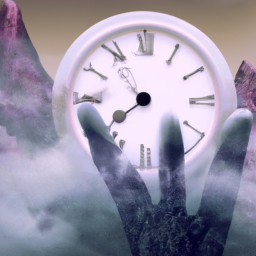
Have you ever woken up from a dream feeling like you’ve experienced a whole lifetime in just a few minutes? Or have you had a dream that felt like it only lasted a few seconds?
Dreams are fascinating and mysterious experiences that have captured the attention of scientists and psychologists for decades. I can help you understand more about them.
One question that often comes up about dreams is how long they typically last. In this article, we’ll explore what we know about the duration of dreams, what factors can influence their length, and how dreams can impact our waking lives.
Key Takeaways
- The duration of dreams varies from person to person and can last from a few seconds to 20-30 minutes.
- Good sleep quality tends to result in longer and more vivid dreams, while sleep deprivation can result in shorter and less memorable dreams.
- Dreams play a significant role in memory consolidation, problem-solving, and creativity, allowing the brain to make connections between seemingly unrelated ideas.
- Dream recall can be improved by keeping a dream journal, getting enough sleep, practicing visualization, and reflecting on dreams upon waking up.
Understanding the REM Stage of Sleep
Did you know that during the REM stage of sleep, your dreams can last anywhere from a few minutes to over an hour? REM stands for ‘Rapid Eye Movement’ and it’s the stage of sleep where most dreaming occurs. It’s called ‘REM’ because your eyes move rapidly back and forth behind your eyelids.
During REM sleep, your brain waves are similar to those of someone who’s awake, but your muscles are paralyzed to prevent you from acting out your dreams. The length of your dream during this stage can vary depending on how long you stay in REM sleep.
Most people experience several cycles of REM sleep throughout the night, with each cycle lasting longer as the night goes on. With that said, let’s dive into the average duration of dreams.
The Average Duration of Dreams
On average, dreams seem to fly by in the blink of an eye. However, the actual duration of a dream varies from person to person and can range anywhere from a few seconds to as long as 20-30 minutes.
Despite this wide range, most dreams tend to last between 5-20 minutes, with the majority falling somewhere in the middle.
It’s important to note that the length of a dream is not necessarily related to the length of the REM stage of sleep. While REM sleep is commonly associated with dreaming, it’s possible to have dreams during other stages of sleep as well.
Factors such as sleep quality, stress levels, and medication use can all influence the duration and intensity of our dreams.
Factors that Influence Dream Duration
Factors like sleep quality, stress levels, and medication use can affect how long our dreams stick with us. When we have a good night’s sleep, we tend to have longer and more vivid dreams. On the other hand, when we are sleep deprived, our dreams may be shorter and less memorable. Stress can also impact the duration of our dreams, with higher levels of stress leading to shorter dreams. Additionally, certain medications can affect the length and quality of our dreams, such as antidepressants which are known to suppress REM sleep, the stage of sleep where we typically have the most vivid dreams.
To better understand how these factors can impact our dreams, consider the following table:
Factor Effect on Dream Duration Emotion Evoked Sleep Quality Longer and more vivid dreams Happiness Stress Levels Shorter dreams Anxiety Medication Use Can affect the length and quality of dreams Confusion
It’s interesting to note how these factors can impact our dreams and ultimately our waking lives. Understanding the factors that influence dream duration can be helpful in promoting healthier sleep habits and managing stress levels, which in turn can lead to more positive dream experiences.
The Impact of Dreams on Our Waking Lives
I’ve always been interested in how my dreams impact my waking life.
From what I’ve read, it seems that dreams play a significant role in memory consolidation, problem-solving, and creativity. They also help us process and regulate our emotions.
I’m excited to explore these topics further and see how my dreams might be influencing my daily life in ways I never even realized.
Memory Consolidation
Dreams are like a mental movie, with the brain using this time to consolidate memories and emotions. During sleep, the brain works to sort through the day’s events and organize them into long-term memory. This process helps us to retain important information and forget the trivial details.
Additionally, dreams can provide a space for emotional processing, allowing us to work through difficult experiences and emotions in a safe and private environment. As we sleep, our brains are busy at work, consolidating memories and emotions. This process is essential for our overall well-being, as it helps us to retain important information and manage our emotions.
In the next section, we will explore how dreams can also contribute to problem-solving and creativity.
Problem Solving and Creativity
When we’re trying to solve a problem or come up with a creative solution, our brain can benefit from the imaginative and unconventional thinking that occurs during sleep. Dreams can offer unique insights and perspectives that we might not consider while awake.
In fact, studies have shown that sleep can improve problem-solving abilities and creativity. During REM sleep, the brain is highly active and can make connections between seemingly unrelated ideas. This can lead to ‘aha’ moments and breakthroughs in problem-solving.
Additionally, dreams can help us think outside the box and approach problems from a different angle. However, it’s important to note that not all dreams are beneficial for problem-solving and creativity. Some dreams may be too chaotic or nonsensical to offer any useful insights.
As we move into the subsequent section about emotional processing, it’s important to remember that dreams can serve multiple functions during sleep. They not only aid in problem-solving and creativity, but also play a role in emotional regulation and memory consolidation.
Emotional Processing
You may have experienced how your emotions can feel amplified or even exaggerated during sleep, as if you’re carrying the weight of the world on your shoulders. This is because dreaming is a way for our brains to process emotional experiences.
During REM (rapid eye movement) sleep, which is when most dreaming occurs, our brains are actively working to sort through memories and emotions. This is why we may wake up feeling sad after a dream where we experienced loss or feeling happy after dreaming about a loved one.
It’s important to pay attention to our dreams and the emotions they bring up, as they can offer insight into our subconscious thoughts and feelings. By becoming more aware of our emotional processing during sleep, we can better understand ourselves and our emotions in waking life.
This leads us to the next section on tips for enhancing dream recall.
Tips for Enhancing Dream Recall
Improving dream recall can be a fascinating and rewarding experience, especially if you’re interested in exploring the depths of your subconscious mind. Here are a few tips that’ve worked for me personally:
-
Keep a dream journal by your bed. This way, as soon as you wake up, you can write down as many details as you can remember about your dream. Even if you only remember a few fragments, write them down. Over time, you may start to notice patterns or recurring themes in your dreams.
-
Get enough sleep. It’s harder to remember your dreams if you’re sleep-deprived. Aim for 7-9 hours of sleep each night.
-
Practice visualization before bed. Imagine yourself in a peaceful, relaxing place. This can help you fall asleep faster and may improve your dream recall.
-
Wake up slowly. Instead of immediately jumping out of bed, try to lie still for a few moments and focus on your dreams. Sometimes, just a few extra seconds of reflection can help you remember more details about your dream.
Frequently Asked Questions
Can dreams be longer or shorter than the average duration?
Dreams can vary in length, sometimes feeling like they last for hours when in reality they only last a few minutes. So yes, dreams can be both longer and shorter than the average duration.
Do people in different age groups experience different dream durations?
As I age, I’ve noticed my dreams tend to be shorter and less vivid. However, I’m not sure if this is true for everyone. It’s possible that age can affect dream duration, but more research is needed to confirm.
Is there a correlation between dream duration and dream content?
Isn’t it funny how the more vivid and exciting my dreams are, the shorter they seem to be? I’ve noticed that my dreams filled with action and adventure always feel like they fly by, while the mundane ones drag on forever.
Can external factors, such as noise or light, affect the duration of dreams?
External factors, like noise or light, can disrupt my sleep and cause me to wake up during a dream, making it feel shorter. However, I’m not sure if they can directly affect the actual duration of the dream itself.
Are there any medical conditions that can affect dream duration?
Oh, just a few medical conditions that can totally mess with dream duration. You know, things like sleep apnea, depression, and even certain medications. Not that I would want my dreams to last any longer…
Conclusion
So, how long do dreams typically last? The answer is not as straightforward as we might think.
While the average dream duration is believed to be between 20-30 minutes, there are a multitude of factors that can influence this, including the stage of sleep we’re in, our age, and even our level of stress.
One theory that has gained traction in recent years is that dreams can serve as a form of emotional regulation and problem-solving. This theory suggests that our dreams may help us process and make sense of our daily experiences, as well as work through any unresolved emotional issues we may be facing.
While more research is needed to fully understand this theory, it certainly adds an interesting layer to the already fascinating world of dreams.
Eislyn is a gifted writer whose words weave enchanting narratives within the realm of dreams. With a profound love for storytelling and a deep curiosity about dreams, Eislyn’s articles transport readers into vivid dreamscapes.
Her writing style is both eloquent and thought-provoking, captivating readers’ imaginations and inspiring them to dive deeper into the mysteries of their own dreams. Eislyn’s exploration of dream symbolism and interpretation adds depth and nuance to our content, making it an absolute pleasure for dream enthusiasts to engage with.
-

 Dream Meaning2 weeks ago
Dream Meaning2 weeks agoInspiring Stories Of Famous People Who Achieved Their Dreams
-

 Dream Meaning1 month ago
Dream Meaning1 month agoWhat Are Vivid Dreams
-

 Dream Meaning1 month ago
Dream Meaning1 month agoWhat Symbolizes Dreams
-

 Lucid Dreaming Techniques2 months ago
Lucid Dreaming Techniques2 months agoHow Long Do Lucid Dreams Last
-

 Dream Meaning1 month ago
Dream Meaning1 month agoWhat Do Sexual Dreams Mean
-

 Dream Meaning2 months ago
Dream Meaning2 months agoHow To Stop Wet Dreams As A Christian
-

 Dream Meaning2 months ago
Dream Meaning2 months agoWhy Do Dreams Feel So Long
-

 Dream Meaning2 months ago
Dream Meaning2 months agoWhat Does It Mean When Your Dreams Come True







